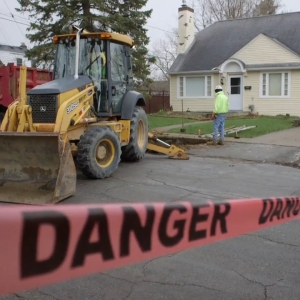FRESH: Biden Strengthens Environmental Reviews for Large Infrastructure Projects
May 3, 2022
Fresh is a biweekly newsletter from Circle of Blue that unpacks the biggest international, state, and local policy news stories facing the Great Lakes region today. Sign up for Fresh: A Great Lakes Policy Briefing, straight to your inbox, every other Tuesday.
— Laura Gersony, Fresh Editor
This Week’s Watersheds
- U.S. President Joe Biden restores several key provisions of a bedrock federal environmental law.
- The former water operator in Flint, Michigan testifies that he sounded the alarm leading up to the city’s lead contamination crisis.
- New York state legislators weigh competing proposals to regulate the cryptocurrency industry.
- Litigation over the transnational Line 5 oil pipeline continues in Wisconsin.
- Subsidies doled out amid a corruption scandal are still flowing to coal plants in Ohio.
A plan to make Michigan into the next “space state” stirs controversy.
“You are the vertical site for Michigan…When people say the great space race is on, they will not only say it’s the entire state of Michigan but come to the [Upper Peninsula].”—Gavin Brown, Michigan Aerospace Manufacturers Association.
Michigan is one of several states pursuing plans to build a commercial spaceport, where businesses can pay to launch satellites and other loads into Earth’s orbit. Supporters sell the venture as a way to create jobs and draw space-industry talent to the region. Residents of the proposed site, a small township on the shores of Lake Superior, have criticized the company’s failure to share information about project risks. Some cite environmental concerns about pollution and debris because the rockets would fly over Lake Superior during launch. If built, the project would be the first launch site in the American Midwest.
Fresh from the Great Lakes News Collaborative
Throughout the Great Lakes region and across the U.S., water systems are aging. In some communities, this means water bills that residents can’t afford or water that’s unsafe to drink. It means that vulnerable systems are even more at risk in a changing climate. From shrinking cities and small towns to the comparatively thriving suburbs, the true cost of water has been deferred for decades. As the nation prepares to pour hundreds of billions of federal dollars into rescuing water systems, the Great Lakes News Collaborative investigates the true cost of water in Michigan.
After Decades of Neglect, Bill Coming Due for Michigan’s Water Infrastructure — Circle of Blue
Many rural towns have neglected drinking water systems for decades — Michigan Radio
Water woes loom for Michigan suburbs, towns after decades of disinvestment — Bridge Michigan
Michigan’s 20th Century water systems too big for its shrinking city populations — Great Lakes Now
More News From the Great Lakes News Collaborative:
Years of regulation may have reduced invasive species risks in the Great Lakes, study says — Great Lakes Now
The Great Lakes News Collaborative includes Bridge Michigan; Circle of Blue; Great Lakes Now at Detroit Public Television; and Michigan Radio, Michigan’s NPR News Leader. We work together to produce news and information about the impact of climate change, pollution, and aging infrastructure on the Great Lakes and drinking water. This independent journalism is supported by the Charles Stewart Mott Foundation. Find all the work here.
The Great Lakes News Collaborative includes Bridge Michigan; Circle of Blue; Great Lakes Now at Detroit Public Television; and Michigan Radio, Michigan’s NPR News Leader. We work together to produce news and information about the impact of climate change, pollution, and aging infrastructure on the Great Lakes and drinking water. This independent journalism is supported by the Charles Stewart Mott Foundation. Find all the work here.
Biden Restores Environmental Reviews for Large Infrastructure Projects
The Biden administration announced last week that it will restore key provisions of the environmental review process for new infrastructure such as pipelines, roads, and energy projects. NPR reports that the decision removes restrictions on the length of environmental reviews and public comment that were imposed under former President Donald Trump, who scaled back the law in an effort to accelerate construction projects and slash government regulation. It will also allow federal officials to factor cumulative impacts of a project, such as its contribution to climate change, into their decision making. The changes will take effect in late May.
In the News
FLINT WATER CRISIS: Flint’s former water plant operator told a jury last week that his superiors ignored his concerns leading up to Flint’s years-long lead contamination crisis. Testifying in Ann Arbor, Michael Glasgow displayed emails he sent to a Michigan environmental agency eight days before the water switch was made. Glasgow wrote that if the plan were to be executed, “it will be against my direction,” MLive reports. The civil trial, in which four Flint children are suing two consultants who advised the city during its water crisis, is entering its second month.
- Why it matters: The crisis in Flint has exacted an indescribable cost and driven deep fissures in public trust. For government leaders and regulators — in Michigan and nationally — it has been a merciless lesson in the political cost of deferring critical infrastructure investments and prioritizing economic concerns over the provision of clean, safe water. Lead was still present in school drinking water as late as 2021, Circle of Blue reports.
CRYPTOCURRENCY: New York state legislators are debating competing proposals for regulating the state’s growing cryptocurrency industry, NY Focus reports. One bill would temporarily ban the conversion of old fossil fuel power plants into “mines” for the digital assets. Critics say this repurposing of fossil fuel infrastructure harms the state’s clean energy goals. A second proposal would create a task force to study the issue, but it stops short of restricting the industry. Cryptocurrency operations gravitate towards retired power plants as fuel for a particularly energy-intensive form of mining known as “proof-of-work,” in which high-powered computers solve a complex math problem.
Looking Ahead
PIPELINES: Litigation continues over the transnational Line 5 oil pipeline, one of the most significant confrontations over environmental safety in regional history. The company that owns the pipeline argued last week that a 50-year agreement with the Bad River Band Reservation allows it to operate on the reservation. Tribal lawyers claim that the agreement allows Line 5 to pass across only 2.8 miles of the reservation, not all 12 miles on which it currently operates. More than a dozen trade unions also told a Wisconsin federal court last week that shutting down the pipeline could lead to job losses for thousands of workers across the Midwest and Canada.
CORRUPTION: Accountability for one of the largest corruption scandals in Ohio state history has been slow to come. An FBI investigation in 2020 exposed a $60 million scheme in which an Ohio utility bribed state lawmakers into passing a $1.3 billion bailout for a struggling nuclear plant operator. But proposed repeals of wrongful coal plant subsidies, amounting to over $250,000 per day, have stalled since October, Energy News Network reports. And much of the law behind the bailouts remains in place.
Other News
- New York announces its largest-ever Water Infrastructure Improvement Act grant for 199 water projects across the state.
- The Great Lakes Water Authority, which provides water and wastewater to a third of Michigan’s population, is now free of an administrative consent order which kept it under close scrutiny for decades.
Laura Gersony covers water policy, infrastructure, and energy for Circle of Blue. She also writes FRESH, Circle of Blue’s biweekly digest of Great Lakes policy news, and HotSpots H2O, a monthly column about the regions and populations most at-risk for water-related hazards and conflict. She is an Environmental Studies and Political Science major at the University of Chicago and an avid Lake Michigan swimmer.











Leave a Reply
Want to join the discussion?Feel free to contribute!